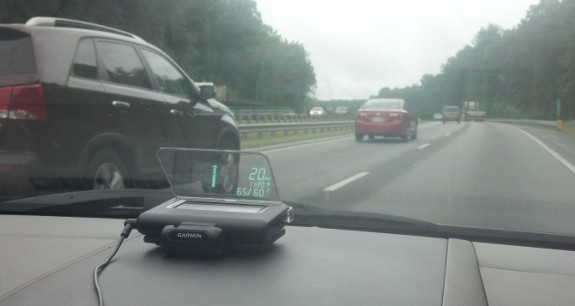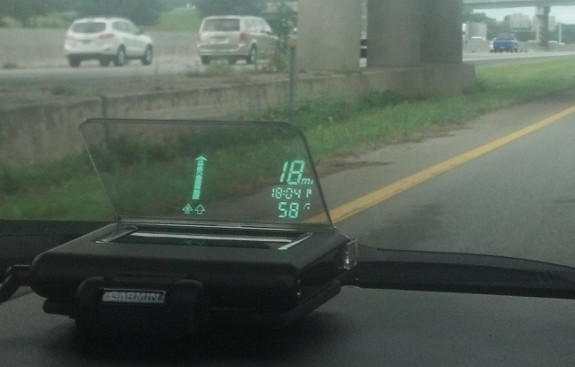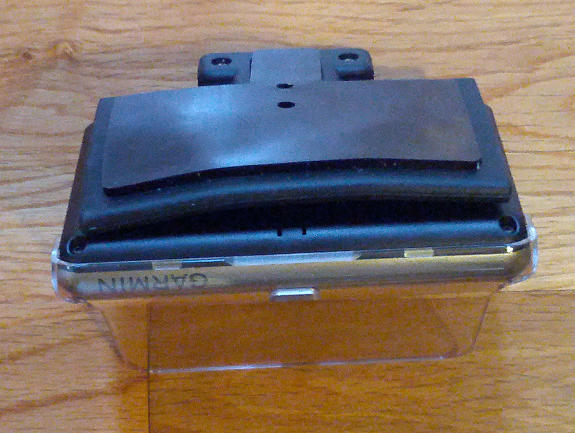
Hands on Garmin HUD review
I got to test the new Garmin HUD (Head-Up Display) on a recent trip to Charleston, SC. The HUD projects navigation information onto your windshield. It has no GPS chip; instead, it receives position and navigation information from your smartphone, which must be running a Garmin navigation app (an additional purchase).
Reflective screen vs windshield
The unit comes with two options for display. One is a reflector lens, which snaps onto the unit in a fixed position. Then you just place the HUD on your dash.
The other option is to install the included film to your windshield. You must clean the windshield and spray it with water before applying the film. While wet, the film can be moved around for the ideal positioning. Then you use a card to scrape out the bubbles, similar to applying a screen protector to your smartphone. You cannot move the film after it has been applied and dried; it can be removed, but cannot be reused.
I used the included reflector lens, as seen in my photos. I did not use the film in my testing.

Garmin HUD showing lane assist
The display
The vacuum fluorescent display uses an ambient light sensor to provide appropriate levels of illumination in all conditions, which it did for me in bright light, at night and in rainy, heavily overcast conditions.
The display shows your next maneuver and distance to it, ETA, current speed, speed limit, and lane assist.
The display shows your next maneuver and distance to it, ETA, current speed, speed limit, and lane assist. It also has icons which can pop up for nearby safety cameras, traffic, the side of the road your destination is on, and if you are exceeding the speed limit. The only thing missing that I really would like to see is the name of the next turn, but the Navigon app I used did a good job of announcing that.
Sticky bottom
The bottom of the HUD uses a sticky material similar to the one found on the bottom of Garmin’s newest friction mount. The base is also flexible, allowing it to conform to the contours of your dash. I had no problems with the unit sliding around. These sticky surfaces do tend to attract dirt though. Garmin says you can “wipe it clean using a cloth dampened only with water,” which works pretty well. I also put a piece of plastic wrap on the bottom anytime I took it off the dash, to help keep it clean.

The “sticky bottom”
Power cord
As you can see in the top image, the power cord connects on the left (driver’s) side of the device. Unfortunately this means you are more likely to have the cord draped across your radio or other controls.
Where it plugs into your cigarette lighter/power source, the power lead includes a USB port, allowing you to keep you phone charged while using only one outlet.
Inaccurate speeds?
One of the things my wife noticed right away was that the HUD was displaying an inaccurate current speed. The phone running the Navigon app was in the center of the car in the cup holder at the time. The key point here is that you are navigating using the GPS chip in the phone; there is no chip in the HUD. Unsurprisingly then, placing the phone on the dash solved this problem, as the HUD then started displaying a speed within 1 MPH of the nuvi next to it. But you may want to consider phone placement if you depend on the HUD’s speed display to keep you from getting a ticket.
App choices
The HUD can use the Garmin StreetPilot for iPhone, or Navigon for iPhone/Android/Windows Phone 8 navigation apps.
The Navigon app
Since I have an Android phone (Samsung Galaxy Nexus), I used the Navigon app. My wife gets car sick, so she typically drives on trips, allowing me to play with my phone or GPS to my heart’s content. Unfortunately, messing with my phone, opening certain apps, etc., would often cause the Navigon app to crash. I occasionally had problems getting the Navigon app to send information to the HUD as well.
So while I’m not a huge fan of the Navigon app, much of that stems from my desire to multi-task with my phone. Yet I did see other problems as well, notably the inability to successfully send a location searched for on Google Maps to the Navigon app.
Military time
One strange thing I noticed — the unit will apparently only display military time, so you’ll see ETA’s like 14:00 instead of 2:00 pm.
Conclusion
I liked the HUD. Did I miss the map? Surprisingly not that much, but that will likely vary from user to user. I liked the minimalism of the HUD, as well as the transparent display which blocked none of my view.
More Garmin HUD reviews
- GigaOm reviews the HUD
- Ars Technica’s review of the heads-up dispaly
- CNet’s review includes a video
- TUAW tests the HUD
- The Independent’s Garmin HUD review
- Popular Mechanics gets into the act too
- The Australian tries out the HUD
- As does Trusted Reviews
- Pocket GPS World gives it an 8 out of 10 rating
I’ll be posting more hands on GPS reviews as they appear, but in the meantime, here are some…
Other Garmin HUD resources
- The official Garmin HUD
web page
Compare prices on the Garmin HUD at these merchants:
- Check the current Garmin Head-Up Display (HUD) Dashboard Mounted Windshield Projector
price at Amazon
- Get the Garmin HUD from GPS City
- Buy the Garmin HUD
direct from Garmin
